Module 2 Unit 3 Language in use课件+音频(共37张PPT)外研版九年级下册
文档属性
| 名称 | Module 2 Unit 3 Language in use课件+音频(共37张PPT)外研版九年级下册 |
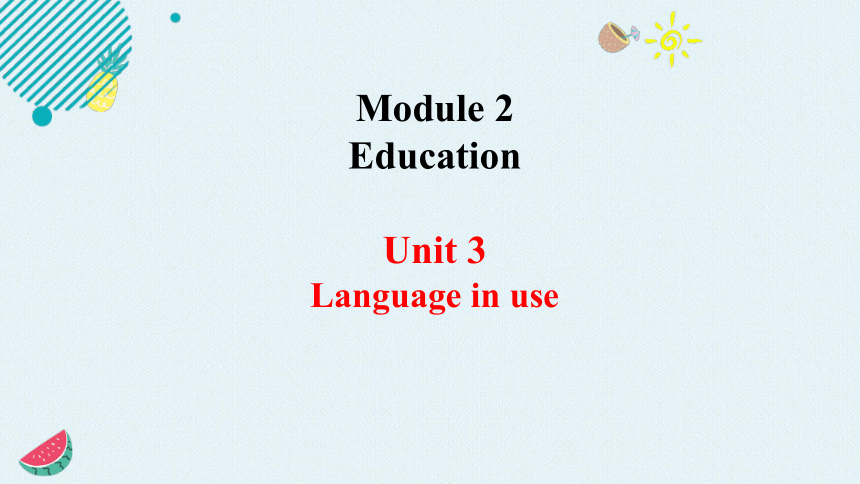
|
|
| 格式 | pptx | ||
| 文件大小 | 44.3MB | ||
| 资源类型 | 教案 | ||
| 版本资源 | 外研版 | ||
| 科目 | 英语 | ||
| 更新时间 | 2024-11-08 13:10:07 | ||
图片预览

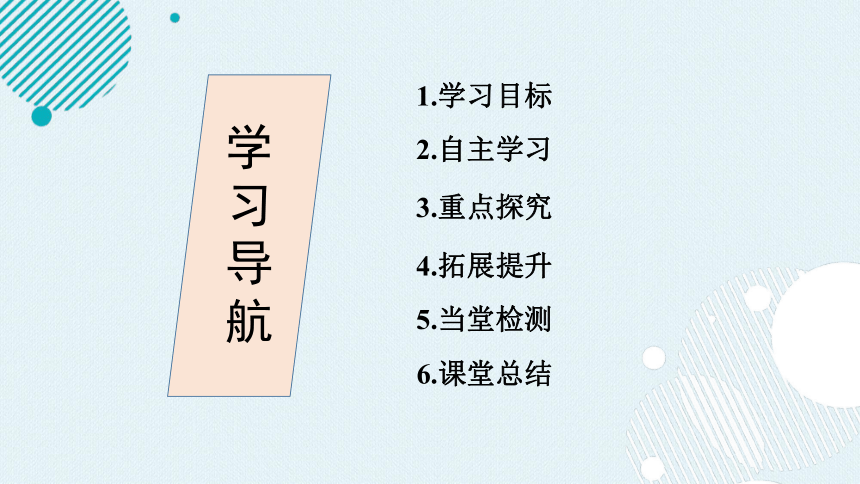
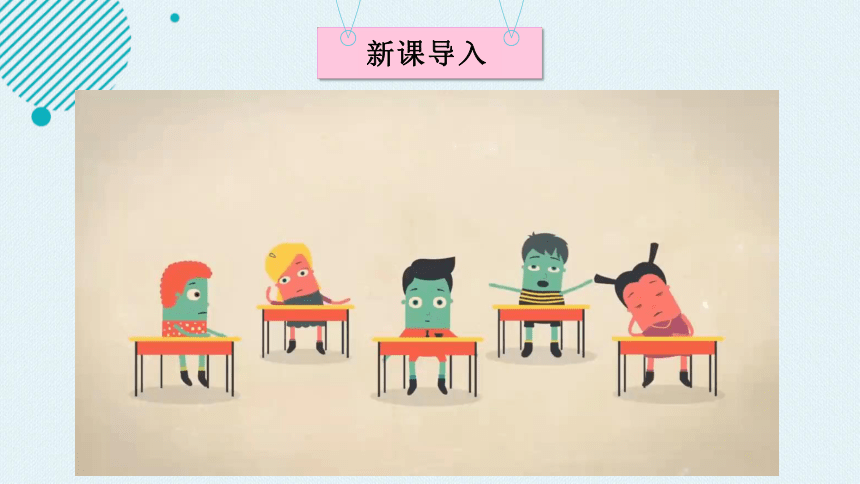
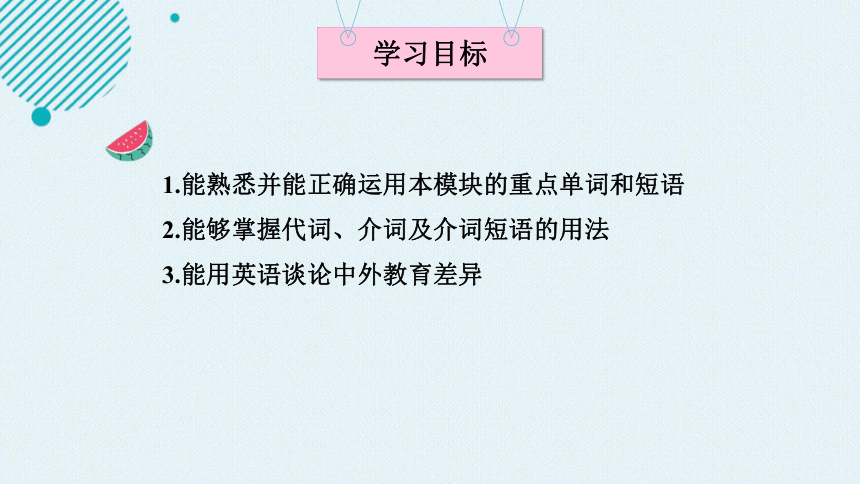
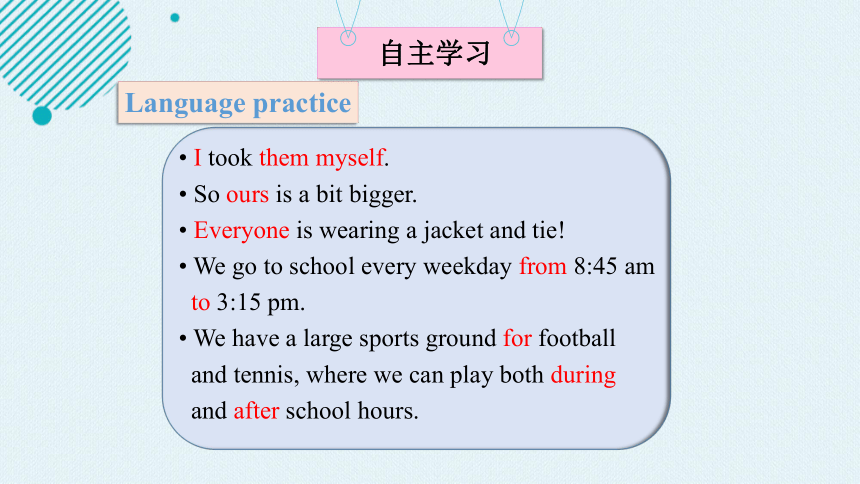
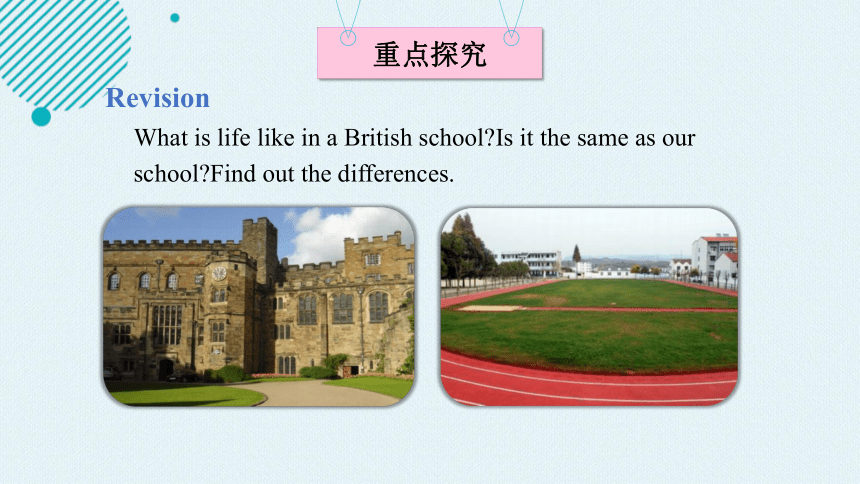
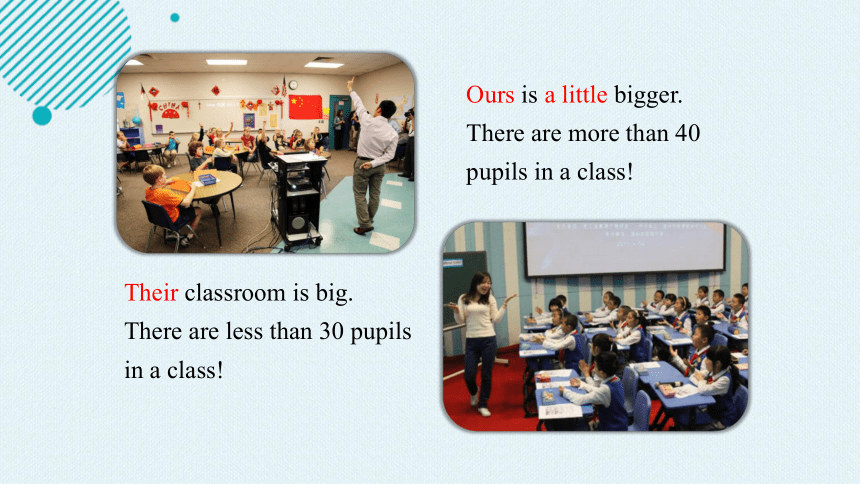
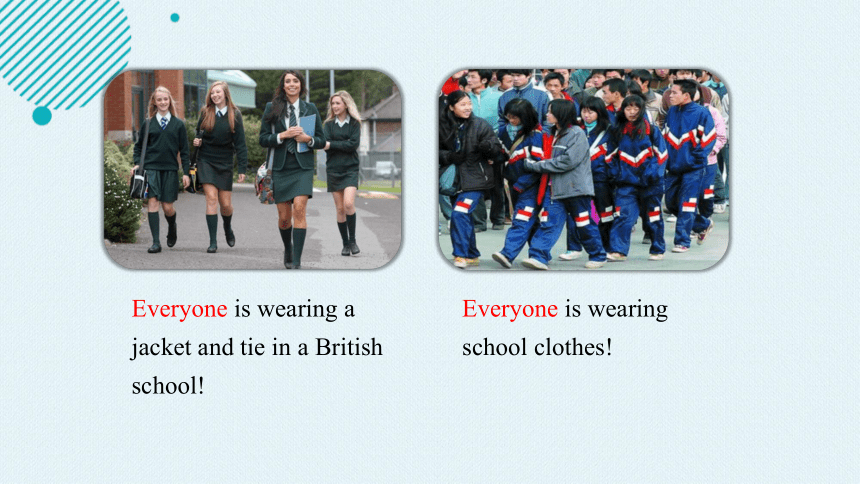
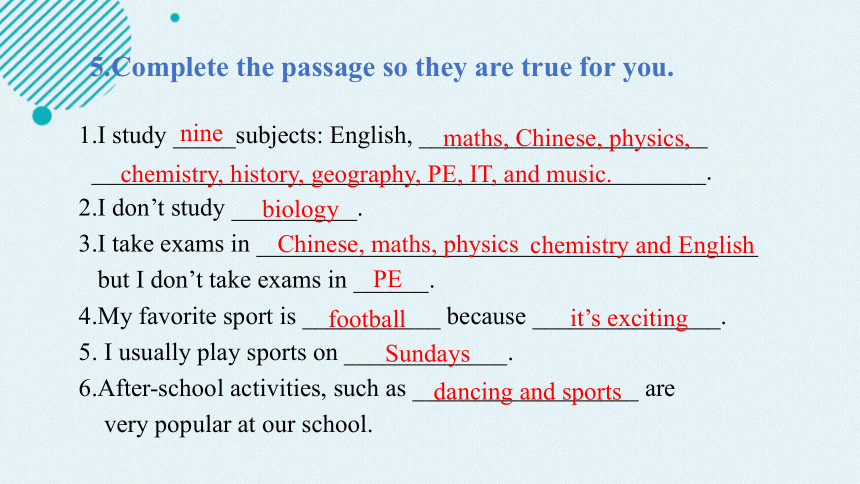
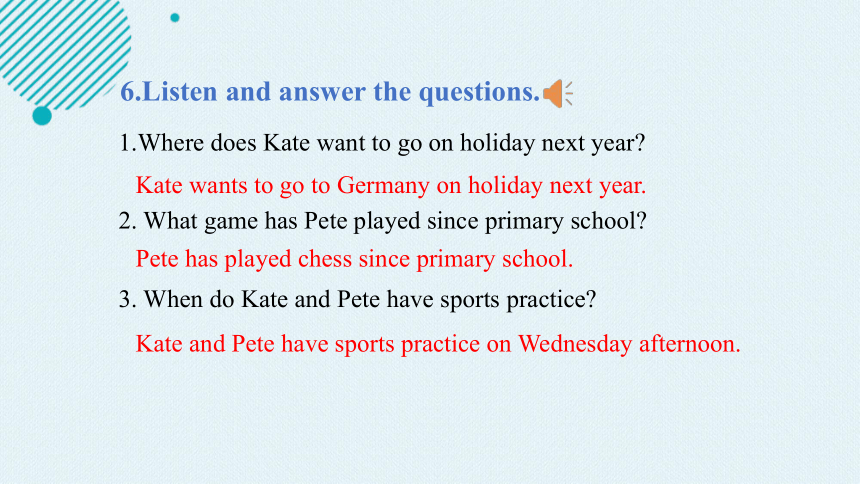
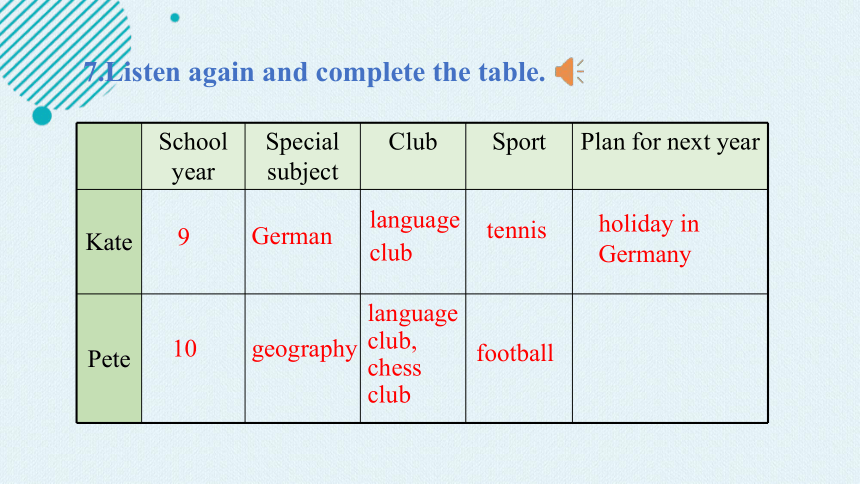
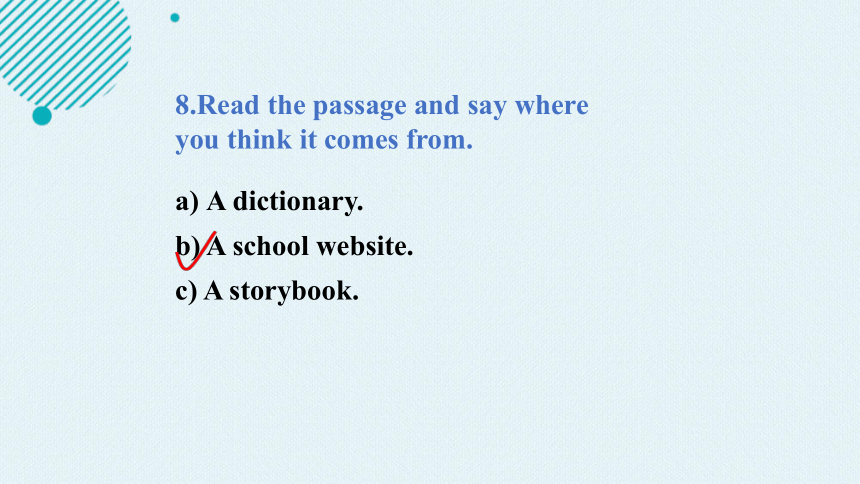
文档简介
(共37张PPT)
Module 2
Education
Unit 3
Language in use
1.学习目标
3.重点探究
2.自主学习
学习导航
5.当堂检测
6.课堂总结
4.拓展提升
新课导入
1.能熟悉并能正确运用本模块的重点单词和短语
2.能够掌握代词、介词及介词短语的用法
3.能用英语谈论中外教育差异
学习目标
自主学习
Language practice
I took them myself.
So ours is a bit bigger.
Everyone is wearing a jacket and tie!
We go to school every weekday from 8:45 am
to 3:15 pm.
We have a large sports ground for football
and tennis, where we can play both during
and after school hours.
重点探究
Revision
What is life like in a British school Is it the same as our school Find out the differences.
Their classroom is big.
There are less than 30 pupils in a class!
Ours is a little bigger.
There are more than 40 pupils in a class!
Everyone is wearing a jacket and tie in a British school!
Everyone is wearing school clothes!
5.Complete the passage so they are true for you.
1.I study _____subjects: English, _______________________
_________________________________________________.
2.I don’t study __________.
3.I take exams in ________________________________________
but I don’t take exams in ______.
4.My favorite sport is ___________ because _______________.
5. I usually play sports on _____________.
6.After-school activities, such as __________________ are
very popular at our school.
nine
chemistry, history, geography, PE, IT, and music.
maths, Chinese, physics,
biology
Chinese, maths, physics
chemistry and English
PE
football
it’s exciting
Sundays
dancing and sports
6.Listen and answer the questions.
1.Where does Kate want to go on holiday next year
2. What game has Pete played since primary school
3. When do Kate and Pete have sports practice
Kate wants to go to Germany on holiday next year.
Pete has played chess since primary school.
Kate and Pete have sports practice on Wednesday afternoon.
7.Listen again and complete the table.
School year Special subject Club Sport Plan for next year
Kate
Pete
9
German
language
club
tennis
holiday in Germany
10
geography
language
club,
chess
club
football
8.Read the passage and say where you think it comes from.
a) A dictionary.
b) A school website.
c) A storybook.
The schoolday begins at 9 am. Class teachers meet the class and check who is present or absent at the start of the day. All the classes meet once a week on Fridays. The head teacher speaks to the whole school. Morning lessons begin at 9:20 am. There are three forty-minute lessons, with a twenty-minute break in between. The lunch break is from 12 pm to 1 pm. Afternoon lessons begin at 1 pm and the schoolday finishes at 3 pm.
All the students study and take exams in maths, science and English. They also choose one subject from history, geography, art, French and Chinese. All the students take PE lessons, but no exams are required.
The chess, music, language and theatre clubs often have meetings after school. Students may join as many clubs as they like, but they must join at least one.
After-school sports practice and matches take place on Wednesday afternoons and Saturday mornings. The school has a good record in sports. Last year, we were the best in football and tennis, and some students won prizes for swimming and running.
Now match the headings with the paragraphs.
a) Clubs
b) School hours
c) Sports
d) Subjects
3
4
2
1
9.Read the passage again and check the true sentences.
1. The head teacher speaks to the whole school on Fridays.
2. The lunch break is less than one hour.
3. Students take exams in all the subjects they study.
4. Students can join more than one club.
√
√
No teachers needed
When it comes to learning, the environment has a big part to play. This has been shown in a long-term study by Professor Mitra from India. He set up computers in a village in India where children could not speak English. They did not know what a computer looked like or what the Internet was.
To everyone’s surprise, children taught themselves how to use the machines in a very short period of time. This suggests that children can learn fast with little help. Professor Mitra thinks this could change schools. He is now working on so-called SOLEs (Self-Organised Learning Environments). He explains that SOLEs include at least a computer and a bench big enough for four pupils. SOLEs have also been tested in some other countries such as the UK and Italy, with encouraging results.
苏伽特·米特拉是英国纽卡斯尔大学教育、交流和语言
科学学院的教授,在过去15年间,他在印度、南非、
柬埔寨、英国、意大利等地开展了著名的“墙中洞”教
育实验。他在印度贫民窟的一处墙体中嵌入了一台联
通网络的电脑,只露出显示器和鼠标,让孩子们尝试
在无任何监控的情况下使用电脑。其研究结论表明,
贫民窟孩子们在没有教师指导的情况下,可以以小组自
学的形式完成各科学习并取得良好成绩。
Observe the following sentences carefully. They are all from this module.
Observe
1. I took them myself.
2. So ours is a bit bigger.
3. Everyone is wearing a jacket and tie!
4. Did you enjoy yourself in London
5. It looks really great.
6. This means more people to play with.
7. Each lesson lasts for an hour.
8. Some people learn German instead of French.
9. Who did Tony visit in London
1.Underline the correct words.
Anna: Hi, Bob. How did your exams go last term
Bob: Great! I got good marks in (1) both/ each maths and geography. What about you
Anna: I did really well in English. That’s (2) anything/ something I’ve always enjoyed. My marks in history and art weren’t so good because (3) none/ neither is my favorite subject. What will you study this term
Bob: I’ve still got (4) a few/ few days before I have to decide.
I’m going to speak to (5) both/ all my teachers and
ask for their advice.
Anna: The teachers say that we must decide for (6) themselves/ ourselves and that (7) none/ neither of them can tell us what to do.
Bob: But I have to get (8) some/ any information because there are so (9) much/ many subjects and it’s very hard to choose.
2.Complete the passage with the words and expression in the box.
both each other His mine myself
A good teacher is someone who is helpful and kind, like my history teacher, Mr. Miller. (1) ______knowledge of the subject is excellent. Because of him, I love history and even read history books by (2) _________after the lessons.
A friend of (3)_________ called Mark also loves this subject and sometimes we lend (4) _________ books or DVDs about history. I like reading (5) ______Western and Chinese history books, but I think Chinese history is my favorite subject.
His
myself
mine
each other
both
3.Complete the sentences with the correct form of the words in the box.
he her him himself our she their themselves they us we
1.John’s homework is too difficult. ____ is not able to do it _______,
so I’m going to help ____ with it.
2. Some people do not have time to wash _____ pets __________, so
_____ pay someone to do it at the pet shop.
3. —Jane is doing a project about family history. ____has asked us to
give ____ some of ____ photos that were taken when we were young.
Have ____ got any, Betty
—Yes, there is a photo of ____with all the children in our family.
He
himself
him
their
themselves
they
She
her
our
we
us
4. Complete the passage with the words in the box. You need to use one word more than once.
at for in on
The school cinema shows lots of foreign films. Next week (1) ____
Friday and Sunday it is showing a French film called Never Say
Goodbye. The story is set (2) ____ Paris (3) ____ the 1960s. The film
lasts two hours and fifteen minutes and starts (4) ____ 6:30 and 9:30
(5) ____ the evenings. Tickets are £5, but there is a special half-price
ticket (6) ____ students from our school. Please bring your student
card if you want a cheap ticket.
on
in
in
at
in
for
Write sentences about the facts.
There are … students and … teachers in our school. Students can study …
After school, there are … and …
Write sentences about your opinions.
The thing I like best about our school is … because …
10.Work in pairs. Discuss and write sentences about your school.
11.Make a leaflet about your school for new students.
Make a leaflet to introduce your school to new students.
Use the sentences in Activity 10.
Draw pictures and make designs where necessary.
拓展提升
Language points
代词有人称代词、指示代词、物主代词、反身代词、不定代词和疑问代词等。
人称代词 主格:I, you, she, he, it, we, they
宾格:me, you, her, him, it, us, them
指示代词 this, these, that, those
物主代词 形容词性: my, your, her, his, its, our, their
名词性:mine, yours, hers, his, ours, theirs
代词
反身代词 myself, yourself, herself, himself, itself, ourselves, yourselves, themselves
不定代词 some, any, both, either, neither, all, none, each, every, many, much, few, a few, little, a little, other, another, one, somebody, nobody, anybody, everyone, everything, something, anything, nothing等
疑问代词 what, which, who, whom, whose等
1. some & any
都表示“一些”,可指可数名词和不可数名词。可做主语和宾语。some多用于肯定句,any多用于否定句、疑问句和条件句。
Some of the students can speak German.
一些学生会说德语。
2. neither & none
都表示否定意思,区别在于:neither表示对两者的否定,而none表示对三者及以上的否定。
不定代词
① I saw two boys at the door, but neither of them is my brother.
我看见两个男孩在门口,但是他们两个都不是我的弟弟。
②None of the students in my class wants/want to take part in this trip.
我们班没有一个学生想去参加这次旅行。
3. (a) little & (a) few
a little和a few表示肯定的概念,而little和few表示否定的概念。
There is little milk in the glass.玻璃杯里几乎没有牛奶 。
He has many friends; but few are true friends/but only a few are true friends.他有许多朋友,但是没有几个真正的朋友/但是只有几个是真正的朋友。
此外,(a) little用于修饰不可数名词,而(a) few用于修饰可数名词。
5. each & either
都表示“每一个”,each可以表示两者或两者以上中的“每一个”。而either只能表示两者中的“每一个”。
e.g. Each of us/ We each got a beautiful card on that special day.
—Which of the two shirts do you want —Either will do.
注意: either表示二选一,表示两者都要用both。
6. 疑问代词
疑问代词用于构成特殊疑问句,包括what, which, who, whom, whose等,代词的选择根据句意要求而定。
e.g. When do you hear a bell at school What are English schools like
How many pupils are there in a class in England
介词
介词
表示时间
at, in, on, before, after, by, until, till, for, during, through, from, since…
表示场所
at, in, on, under, by, near, between, around…
表示方向
into, out of, along, across…
表示方式、手段
by, with, on…
表示材料
of, from, in…
其他
of, from, as…
表示时间的介词
1. 表示年、月、日、时刻等用 at, in, on
2. 表示时间的前后用 before, after
3. 表示期限等用 by, until, till
4. 表示期间等用 for, during, through
5. 表示时间的起点等用 from, since
6. 表示时间的经过等用 in, within
表示场所的介词
表示方向的介词
at, in, on, under, by, near, between, around, opposite
into, out of, along, across, through, up, past
表示场所、方向的介词
当堂检测
根据中文及大意填写单词
My name is Sara and I am 14. Now I live in 1.________(法国) with my family. I’m a 2._________(中等的) school student. I like my school and I go to school very early every morning. I have never been 3.________(缺席) from school since I attended this school. I learn many 4._________(科目) every term. 5._________(在…之中) them, I like 6.________(历史) best. I study very hard and I can not only 7.________(通过) the exams but also get good grades. On weekdays, I usually do some after- school 8.________(活动), such as playing volleyball and tennis from 3:40 to 4:20. At weekends, I join a language 9.________(社团) and I practise speaking French with the local people so that I can 10._________(提高) my language. I love the country and the people.
France
secondary
absent
subjects
Among
history
pass
activities
society
improve
课堂总结
Module 2
Unit 3
1.代词、介词与介词短语的用法
2.用英语谈论中外教育差异
重点单词和短语:
ours,tie,row,pool,in rows,play with,be absent from, pass one’s exam,once a term,secondary school,be away from
Module 2
Education
Unit 3
Language in use
1.学习目标
3.重点探究
2.自主学习
学习导航
5.当堂检测
6.课堂总结
4.拓展提升
新课导入
1.能熟悉并能正确运用本模块的重点单词和短语
2.能够掌握代词、介词及介词短语的用法
3.能用英语谈论中外教育差异
学习目标
自主学习
Language practice
I took them myself.
So ours is a bit bigger.
Everyone is wearing a jacket and tie!
We go to school every weekday from 8:45 am
to 3:15 pm.
We have a large sports ground for football
and tennis, where we can play both during
and after school hours.
重点探究
Revision
What is life like in a British school Is it the same as our school Find out the differences.
Their classroom is big.
There are less than 30 pupils in a class!
Ours is a little bigger.
There are more than 40 pupils in a class!
Everyone is wearing a jacket and tie in a British school!
Everyone is wearing school clothes!
5.Complete the passage so they are true for you.
1.I study _____subjects: English, _______________________
_________________________________________________.
2.I don’t study __________.
3.I take exams in ________________________________________
but I don’t take exams in ______.
4.My favorite sport is ___________ because _______________.
5. I usually play sports on _____________.
6.After-school activities, such as __________________ are
very popular at our school.
nine
chemistry, history, geography, PE, IT, and music.
maths, Chinese, physics,
biology
Chinese, maths, physics
chemistry and English
PE
football
it’s exciting
Sundays
dancing and sports
6.Listen and answer the questions.
1.Where does Kate want to go on holiday next year
2. What game has Pete played since primary school
3. When do Kate and Pete have sports practice
Kate wants to go to Germany on holiday next year.
Pete has played chess since primary school.
Kate and Pete have sports practice on Wednesday afternoon.
7.Listen again and complete the table.
School year Special subject Club Sport Plan for next year
Kate
Pete
9
German
language
club
tennis
holiday in Germany
10
geography
language
club,
chess
club
football
8.Read the passage and say where you think it comes from.
a) A dictionary.
b) A school website.
c) A storybook.
The schoolday begins at 9 am. Class teachers meet the class and check who is present or absent at the start of the day. All the classes meet once a week on Fridays. The head teacher speaks to the whole school. Morning lessons begin at 9:20 am. There are three forty-minute lessons, with a twenty-minute break in between. The lunch break is from 12 pm to 1 pm. Afternoon lessons begin at 1 pm and the schoolday finishes at 3 pm.
All the students study and take exams in maths, science and English. They also choose one subject from history, geography, art, French and Chinese. All the students take PE lessons, but no exams are required.
The chess, music, language and theatre clubs often have meetings after school. Students may join as many clubs as they like, but they must join at least one.
After-school sports practice and matches take place on Wednesday afternoons and Saturday mornings. The school has a good record in sports. Last year, we were the best in football and tennis, and some students won prizes for swimming and running.
Now match the headings with the paragraphs.
a) Clubs
b) School hours
c) Sports
d) Subjects
3
4
2
1
9.Read the passage again and check the true sentences.
1. The head teacher speaks to the whole school on Fridays.
2. The lunch break is less than one hour.
3. Students take exams in all the subjects they study.
4. Students can join more than one club.
√
√
No teachers needed
When it comes to learning, the environment has a big part to play. This has been shown in a long-term study by Professor Mitra from India. He set up computers in a village in India where children could not speak English. They did not know what a computer looked like or what the Internet was.
To everyone’s surprise, children taught themselves how to use the machines in a very short period of time. This suggests that children can learn fast with little help. Professor Mitra thinks this could change schools. He is now working on so-called SOLEs (Self-Organised Learning Environments). He explains that SOLEs include at least a computer and a bench big enough for four pupils. SOLEs have also been tested in some other countries such as the UK and Italy, with encouraging results.
苏伽特·米特拉是英国纽卡斯尔大学教育、交流和语言
科学学院的教授,在过去15年间,他在印度、南非、
柬埔寨、英国、意大利等地开展了著名的“墙中洞”教
育实验。他在印度贫民窟的一处墙体中嵌入了一台联
通网络的电脑,只露出显示器和鼠标,让孩子们尝试
在无任何监控的情况下使用电脑。其研究结论表明,
贫民窟孩子们在没有教师指导的情况下,可以以小组自
学的形式完成各科学习并取得良好成绩。
Observe the following sentences carefully. They are all from this module.
Observe
1. I took them myself.
2. So ours is a bit bigger.
3. Everyone is wearing a jacket and tie!
4. Did you enjoy yourself in London
5. It looks really great.
6. This means more people to play with.
7. Each lesson lasts for an hour.
8. Some people learn German instead of French.
9. Who did Tony visit in London
1.Underline the correct words.
Anna: Hi, Bob. How did your exams go last term
Bob: Great! I got good marks in (1) both/ each maths and geography. What about you
Anna: I did really well in English. That’s (2) anything/ something I’ve always enjoyed. My marks in history and art weren’t so good because (3) none/ neither is my favorite subject. What will you study this term
Bob: I’ve still got (4) a few/ few days before I have to decide.
I’m going to speak to (5) both/ all my teachers and
ask for their advice.
Anna: The teachers say that we must decide for (6) themselves/ ourselves and that (7) none/ neither of them can tell us what to do.
Bob: But I have to get (8) some/ any information because there are so (9) much/ many subjects and it’s very hard to choose.
2.Complete the passage with the words and expression in the box.
both each other His mine myself
A good teacher is someone who is helpful and kind, like my history teacher, Mr. Miller. (1) ______knowledge of the subject is excellent. Because of him, I love history and even read history books by (2) _________after the lessons.
A friend of (3)_________ called Mark also loves this subject and sometimes we lend (4) _________ books or DVDs about history. I like reading (5) ______Western and Chinese history books, but I think Chinese history is my favorite subject.
His
myself
mine
each other
both
3.Complete the sentences with the correct form of the words in the box.
he her him himself our she their themselves they us we
1.John’s homework is too difficult. ____ is not able to do it _______,
so I’m going to help ____ with it.
2. Some people do not have time to wash _____ pets __________, so
_____ pay someone to do it at the pet shop.
3. —Jane is doing a project about family history. ____has asked us to
give ____ some of ____ photos that were taken when we were young.
Have ____ got any, Betty
—Yes, there is a photo of ____with all the children in our family.
He
himself
him
their
themselves
they
She
her
our
we
us
4. Complete the passage with the words in the box. You need to use one word more than once.
at for in on
The school cinema shows lots of foreign films. Next week (1) ____
Friday and Sunday it is showing a French film called Never Say
Goodbye. The story is set (2) ____ Paris (3) ____ the 1960s. The film
lasts two hours and fifteen minutes and starts (4) ____ 6:30 and 9:30
(5) ____ the evenings. Tickets are £5, but there is a special half-price
ticket (6) ____ students from our school. Please bring your student
card if you want a cheap ticket.
on
in
in
at
in
for
Write sentences about the facts.
There are … students and … teachers in our school. Students can study …
After school, there are … and …
Write sentences about your opinions.
The thing I like best about our school is … because …
10.Work in pairs. Discuss and write sentences about your school.
11.Make a leaflet about your school for new students.
Make a leaflet to introduce your school to new students.
Use the sentences in Activity 10.
Draw pictures and make designs where necessary.
拓展提升
Language points
代词有人称代词、指示代词、物主代词、反身代词、不定代词和疑问代词等。
人称代词 主格:I, you, she, he, it, we, they
宾格:me, you, her, him, it, us, them
指示代词 this, these, that, those
物主代词 形容词性: my, your, her, his, its, our, their
名词性:mine, yours, hers, his, ours, theirs
代词
反身代词 myself, yourself, herself, himself, itself, ourselves, yourselves, themselves
不定代词 some, any, both, either, neither, all, none, each, every, many, much, few, a few, little, a little, other, another, one, somebody, nobody, anybody, everyone, everything, something, anything, nothing等
疑问代词 what, which, who, whom, whose等
1. some & any
都表示“一些”,可指可数名词和不可数名词。可做主语和宾语。some多用于肯定句,any多用于否定句、疑问句和条件句。
Some of the students can speak German.
一些学生会说德语。
2. neither & none
都表示否定意思,区别在于:neither表示对两者的否定,而none表示对三者及以上的否定。
不定代词
① I saw two boys at the door, but neither of them is my brother.
我看见两个男孩在门口,但是他们两个都不是我的弟弟。
②None of the students in my class wants/want to take part in this trip.
我们班没有一个学生想去参加这次旅行。
3. (a) little & (a) few
a little和a few表示肯定的概念,而little和few表示否定的概念。
There is little milk in the glass.玻璃杯里几乎没有牛奶 。
He has many friends; but few are true friends/but only a few are true friends.他有许多朋友,但是没有几个真正的朋友/但是只有几个是真正的朋友。
此外,(a) little用于修饰不可数名词,而(a) few用于修饰可数名词。
5. each & either
都表示“每一个”,each可以表示两者或两者以上中的“每一个”。而either只能表示两者中的“每一个”。
e.g. Each of us/ We each got a beautiful card on that special day.
—Which of the two shirts do you want —Either will do.
注意: either表示二选一,表示两者都要用both。
6. 疑问代词
疑问代词用于构成特殊疑问句,包括what, which, who, whom, whose等,代词的选择根据句意要求而定。
e.g. When do you hear a bell at school What are English schools like
How many pupils are there in a class in England
介词
介词
表示时间
at, in, on, before, after, by, until, till, for, during, through, from, since…
表示场所
at, in, on, under, by, near, between, around…
表示方向
into, out of, along, across…
表示方式、手段
by, with, on…
表示材料
of, from, in…
其他
of, from, as…
表示时间的介词
1. 表示年、月、日、时刻等用 at, in, on
2. 表示时间的前后用 before, after
3. 表示期限等用 by, until, till
4. 表示期间等用 for, during, through
5. 表示时间的起点等用 from, since
6. 表示时间的经过等用 in, within
表示场所的介词
表示方向的介词
at, in, on, under, by, near, between, around, opposite
into, out of, along, across, through, up, past
表示场所、方向的介词
当堂检测
根据中文及大意填写单词
My name is Sara and I am 14. Now I live in 1.________(法国) with my family. I’m a 2._________(中等的) school student. I like my school and I go to school very early every morning. I have never been 3.________(缺席) from school since I attended this school. I learn many 4._________(科目) every term. 5._________(在…之中) them, I like 6.________(历史) best. I study very hard and I can not only 7.________(通过) the exams but also get good grades. On weekdays, I usually do some after- school 8.________(活动), such as playing volleyball and tennis from 3:40 to 4:20. At weekends, I join a language 9.________(社团) and I practise speaking French with the local people so that I can 10._________(提高) my language. I love the country and the people.
France
secondary
absent
subjects
Among
history
pass
activities
society
improve
课堂总结
Module 2
Unit 3
1.代词、介词与介词短语的用法
2.用英语谈论中外教育差异
重点单词和短语:
ours,tie,row,pool,in rows,play with,be absent from, pass one’s exam,once a term,secondary school,be away from
同课章节目录
- Module 1 Travel
- Unit 1 We toured the city by bus and by taxi
- Unit 2 It's a long story.
- Unit 3 Language in use
- Module 2 Education
- Unit 1 They don't sit in rows.
- Unit 2 What do I like best about school?
- Unit 3 Language in use
- Module 3 Life now and then
- Unit 1 They sometimes work harder.
- Unit 2 I think life is better today.
- Unit 3 Language in use.
- Module 4 Rules and suggestions
- Unit 1 You must be careful of falling stones.
- Unit 2 we must keep the camp clean.
- Unit 3 Language in use.
- Revison A
- Module 5 Look after yourself
- Unit 1 We'd better get you to hospital.
- Unit 2 Get off the sofa!
- Unit 3 Language in use.
- Module 6 Eating togethe
- Unit 1 When is the school-leavers' party?
- Unit 2 Knives and forks are used for most Western
- Unit 3 Language in use
- Module 7 English for you and me
- Unit 1 Have you ever been to an English corner?
- Unit 2 We all own English.
- Unit 3 Language in use
- Module 8 My future life
- Unit 1 Here's to our friendship and the future
- Unit 2 I know that you will be better at maths.
- Unit 3 Language in use
- Revison B
